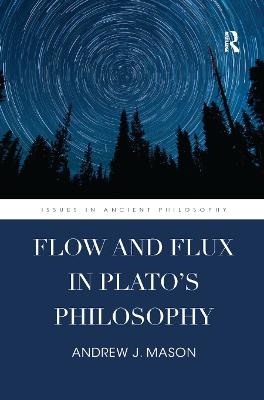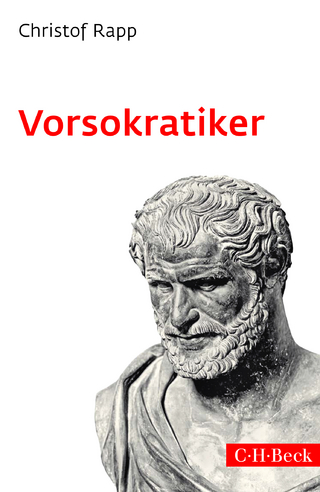
Flow and Flux in Plato's Philosophy
Seiten
2019
Routledge (Verlag)
978-0-367-87318-9 (ISBN)
Routledge (Verlag)
978-0-367-87318-9 (ISBN)
This study argues that traditional approaches to Plato's thought, which centre on Forms and their opposition to sensible flux, leave something essential out of account. There is in Plato a notion of ‘flow’ which is distinct from material ‘flux’. It applies both to souls and concrete sensible things (including the cosmos), is compatible with rath
In this bold new study, Andrew J. Mason seeks both to shed light on the key issue of flux in Plato’s work, and to show that there is also in Plato a notion of flow that needs to be distinguished from flux. Mason brings out the importance of this hitherto neglected distinction, and proposes on its basis a new way of understanding the development of Plato’s thought.
The opposition between the ‘being’ of Forms and the ‘becoming’ or ‘flux’ of sensibles has been fundamental to the understanding of Plato from Aristotle to the present day. One key concern of this volume is to clarify which kinds or levels of flux Plato accepts in sensibles. In addition, Mason argues that this traditional approach is unsatisfactory, as it leaves out the important notion of flow. Unlike flux, flow is a kind of motion that does not entail intrinsic change. It is also not restricted to the sensible, but covers motions of soul as well, including the circular motion of nous (intelligence) that is crucial in Plato’s later thought, particularly his cosmology. In short, flow is not incompatible with ‘being’, and in this study Plato’s development is presented, largely, as his arrival at this view, in correction of his earlier conflation of flux and flow in establishing the dichotomy between being and becoming.
Mason’s study offers fresh insights into many dialogues and difficult passages in Plato’s oeuvre, and situates Plato’s conception and usage of ‘flow’ and ‘flux’ in relation to earlier usage in the Greek poetic tradition and the Presocratic thinkers, particularly Heraclitus. The first study of its kind, Flow and Flux uncovers dimensions of Plato’s thinking that may reshape the way his philosophy is understood.
In this bold new study, Andrew J. Mason seeks both to shed light on the key issue of flux in Plato’s work, and to show that there is also in Plato a notion of flow that needs to be distinguished from flux. Mason brings out the importance of this hitherto neglected distinction, and proposes on its basis a new way of understanding the development of Plato’s thought.
The opposition between the ‘being’ of Forms and the ‘becoming’ or ‘flux’ of sensibles has been fundamental to the understanding of Plato from Aristotle to the present day. One key concern of this volume is to clarify which kinds or levels of flux Plato accepts in sensibles. In addition, Mason argues that this traditional approach is unsatisfactory, as it leaves out the important notion of flow. Unlike flux, flow is a kind of motion that does not entail intrinsic change. It is also not restricted to the sensible, but covers motions of soul as well, including the circular motion of nous (intelligence) that is crucial in Plato’s later thought, particularly his cosmology. In short, flow is not incompatible with ‘being’, and in this study Plato’s development is presented, largely, as his arrival at this view, in correction of his earlier conflation of flux and flow in establishing the dichotomy between being and becoming.
Mason’s study offers fresh insights into many dialogues and difficult passages in Plato’s oeuvre, and situates Plato’s conception and usage of ‘flow’ and ‘flux’ in relation to earlier usage in the Greek poetic tradition and the Presocratic thinkers, particularly Heraclitus. The first study of its kind, Flow and Flux uncovers dimensions of Plato’s thinking that may reshape the way his philosophy is understood.
Andrew J. Mason holds a PhD in Philosophy from Macquarie University, Australia. He was previously a lecturer at Griffith University and Macquarie University.
Introduction 1. Everflowing being in the Laws 2. The pursuit of flow via etymology in the Cratylus 3. The aporia at the end of the Cratylus, and the implicit reduction of flow to flux 4. Flow and the Form of Beauty in the Phaedrus 5. Flux and flow in the Timaeus 6. The problem of natural catastrophe in the late dialogues 7. Plato and the problem of natural justice Appendix: On the relative dates of the dialogues
| Erscheinungsdatum | 16.12.2019 |
|---|---|
| Reihe/Serie | Issues in Ancient Philosophy |
| Verlagsort | London |
| Sprache | englisch |
| Maße | 156 x 234 mm |
| Gewicht | 453 g |
| Themenwelt | Geisteswissenschaften ► Philosophie ► Philosophie Altertum / Antike |
| ISBN-10 | 0-367-87318-4 / 0367873184 |
| ISBN-13 | 978-0-367-87318-9 / 9780367873189 |
| Zustand | Neuware |
| Informationen gemäß Produktsicherheitsverordnung (GPSR) | |
| Haben Sie eine Frage zum Produkt? |
Mehr entdecken
aus dem Bereich
aus dem Bereich
mit Sokrates, Seneca, Platon & Co. im Gespräch
Buch | Hardcover (2023)
FinanzBuch Verlag
CHF 25,20


